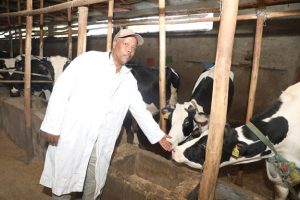BY EPHREM ANDARGACHEW
States in the world have been taking various measures to ensure food security for their citizens. But it has been a challenging task to provide food at the individual, household, national, regional, and global levels. Because food security could be achieved when all people, at all times, have physical and economic access to sufficient, safe, and nutritious food to meet their dietary needs and food preference for an active and healthy life.
Climate change is one of the factors that affect the issue of food security. Climate change is already affecting food security through increasing temperatures, changing precipitation patterns, and greater frequency of some extreme events. Based on indigenous and local knowledge indicators, climate change is affecting food security in dry lands, particularly in Africa.
Hence, countries across the globe devise various mechanisms to ensure food security. Ethiopia, as part and parcel of Africa, has been implementing several programs, including green legacy initiative programs and the provision of improved/selected seeds to farmers, to ensure food security.
Ethiopia indeed has a variety of indigenous plants which have essential benefits for environmental balance and economic development. Nonetheless, these plants are prone to extinction and degradation by the local peoples for various purposes.
The loss of these plants affects both the environment and the food security of the county. Hence, conservation and protection strategies of indigenous plants have multipurpose which benefits both the society and the communities. Mostly the people of Ethiopia, apart from charcoal, timber, fuel wood, medications, and farm implements, cultivate indigenous tree species to provide food. Besides, the farmers generally prefer indigenous multipurpose crops and Horticulture species since they adapted to the environment and are already an integral part of the ecosystem.
Ethiopian Biodiversity Institute Crop and Horticulture Director General Wubeshet Teshome said that Ethiopia has a variety of climate and soil types that can grow diverse crops and plants which could be used to ensure food security and foreign markets. These plants are rich in vitamins, carbohydrates, and other nutrients that give a major portion to an Ethiopian everyday dish mix.
Indeed, since the launching of the green legacy initiative program in 2019, Ethiopia has planted various types of trees including indigenous tree seedlings which could be a source of food across the country. Ethiopia has several drought-resistant indigenous crop and horticulture species that are better at mitigating climate change than select/ best seeds. They also adopt the weather condition of the country, he added.
Nevertheless, the amount of production, for some crops and horticulture, is less compared with select/ best seeds, indigenous crops and Horticulture are better at mitigating climate change, resilience to diseases, and so on than immigrant species. Moreover, Ethiopia is rich not only in edible crops and horticulture but also in plants that are used for traditional medicine. In Ethiopia, there are over 6027 species of plants, of these more than 2000 plants have been used for natural medicinal purposes and 10 percent of the plants are endemic and used only in the country. But these traditional medicine plants have faced extinction that comes from both humans and nature made.
Ethiopian Biodiversity Institute Research Dissemination, and Project Implementation Director and Botanist Tesfaye Awas (Ph.D) told The Ethiopian Herald that those plants which are used for traditional medicine have faced various challenges such as environmental degradation, deforestation, recurrent drought, and various anthropogenic activities.
Besides, habitat destruction, overexploitation, erosion, lack of effective regulation, and so on are threatening the medicinal plant resources of the country. Hence, it is imperative to work to conserve and utilize indigenous crops and horticulture, he underlined.
As stated by Wubeshet, indigenous seeds are the foundation of the selected/best seed. So, it is vital maintaining food security by planting the existing indigenous crops and horticulture seedling species. Because the selected/best seeds do not remain productive all the time. Their productivity also decreases every time.
Therefore, it is impossible to ensure food security by only choosing the selected/ best seeds; it is expected to use existing indigenous seeds on a large scale. In addition, indigenous species are the wealth of the country and the world, so they should be conserved, protected, improved, and utilized carefully.
Although sometimes after the improved variety of seeds is released, it is not possible to distribute it to everyone, so a small amount of select/best seeds is given to the farmers which is not enough to multiply and use them. Hence, it is important to provide indigenous seeds to ensure the food security of the country since they can withstand climate change, drought, and diseases.
THE ETHIOPIAN HERALD WEDNESDAY 3 AUGUST 2022




